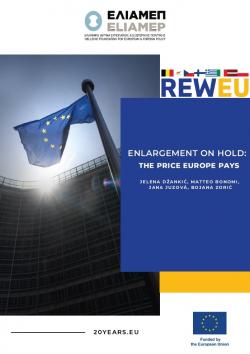Enlargement on Hold: The Price Europe Pays

The European Union (EU) enlargement process is currently undergoing a critical phase influenced by recent geopolitical events and internal dynamics. The Russian invasion of Ukraine has brought the question of EU enlargement to the forefront of discussions on European security architecture. This development has reignited debates on the future of Europe and its role in the broader European continent and the world. Enlargement has historically played a transformative role in integrating Central and Eastern European countries into the EU, fostering democracy, stability, and prosperity. However, challenges in the Western Balkans have highlighted the need for a re-evaluation of how enlargement unfolds, taking into account realistic timelines and sustained commitment to the accession process. As the EU grapples with the implications of prolonged enlargement, public and policy debates have predominantly focused on the EU’s internal institutional reform, financial considerations, and border security. However, attention must also be directed towards the candidate countries, and the impact that the future enlargement decisions will have on them. This paper assesses the effects and trade-offs of the different enlargement modalities that could be applied to the Western Balkan and Eastern European candidates, focusing on economy, democracy and security. The authors depart from the lessons of the past, drawing insights from the 2004 ‘Big Bang’ enlargement, the 2007 enlargement to Bulgaria and Romania, and the two decades of European integration in the Western Balkan states. Looking ahead, a common vision and strategy among EU institutions, member states, and candidate countries are crucial for navigating the complexities of the enlargement process. Coordinated decision-making and a commitment to upholding European values will be essential in ensuring the integrity and effectiveness of the EU's enlargement strategy, shaping the future of the European continent and the EU's role on the global stage.
-
Dati bibliografici
(with Jelena Džankić, Jana Juzová, Bojana Zorić), REWEU Project Publications, No. 1/2024, 12 p.



